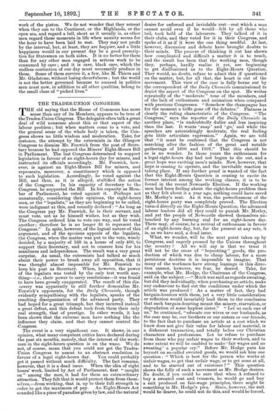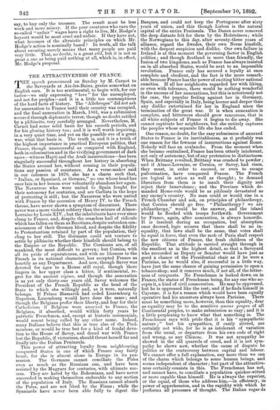THE TRADES-UNION CONGRESS. T HE old saying that the House of
Commons has more sense than any of its Members, appears to be true of the Trades-Union Congress. The delegates often talk a great deal of wild nonsense about this or that aspect of the labour problem ; but when matters come to a vote, and the general sense of the whole body is taken, the Con- gress shows no little wisdom and moderation. Take, for instance, the attempt by the extremists in the Glasgow Congress to dismiss Mr. Fenwick from the post of Secre- tary because he had opposed the Miners' Eight-Hours Bill in Parliament. The last Congress determined to support legislation in favour of an eight-hours day for miners, and instructed its officials accordingly. Mr. Fenwick, how- ever, is against an Eight-Hours Bill for miners, and represents, moreover, a constituency which is opposed to such legislation. Accordingly, he voted against the Bill, and thus, as it is alleged, stultified the action of the Congress. In his capacity of Secretary to the Congress, he supported the Bill. In his capacity as Mem- ber of Parliament, he voted against it. Perhaps not unnaturally, considering their opinions, the eight-hours men, or the "legalists," as they are beginning to be called, were indignant at this, and roundly declared : " As long as the Congress pay Mr. Fenwick, he is their servant, and must vote, not as he himself wishes, but as they wish. The Congress ordered him to vote one way, and he voted another ; therefore he is no longer fit to represent the Congress." In spite, however, of the logical nature of this argument, and of the specious appeals of the legalists, the Congress, when the matter was put to the vote, wisely decided, by a majority of 168 in a house of only 400, to support their Secretary, and not to censure him for his manliness and independence. The result was a very great surprise. As usual, the extremists had talked so much about their power to brush away all opposition, that it was thought almost impossible for Mr. Fenwick to keep his post as Secretary. When, however, the power of the legalists was tested by the only test worth any- thing—i.e., their power to carry resolutions—it was found to have been grossly exaggerated. The result of this dis- covery was apparently to still further demoralise Mr. Fenwick's opponents, for the Daily Chronicle, though evidently sympathising with the legalists, speaks of the resulting disorganisation of the advanced party. They had hoped for a great triumph, but they incurred instead a great defeat, and this defeat took from them their only real strength, that of prestige. In other words, it has been shown that the extreme men have nothing like the influence they claim, and that they cannot control the Congress.
The event is a very significant one. It shows, in our opinion, what many competent critics have declared during the past six months, namely, that the interest of the work- men in the eight-hours question is on the wane. We do not, of course, mean that you could not get the Trades- Union Congress to assent to an abstract resolution in favour of a legal eight-hours day. You could probably get it passed without much difficulty. The fact remains, however, that it is a dead issue. When the idea of eight hours' work, limited by Act of Parliament, first " caught on " among the men, it had for them an extraordinary attraction. They felt that it would protect them from them- selves,—from working, that is, up to their full strength in order to get the maximum of pay. An Eight-Hours Act sounded like a piece of paradise given bylaw, and the natural desire for enforced and inviolable rest—rest which a man cannot avoid even if be would—felt by all those who toil, took hold of the labourers. They talked of it in their clubs, and they voted for it in their Congress, and spoke of it as if it were the one thing needful. At last, however, discussion and debate have brought doubts to their minds. The process of thinking it out has shown how complicated and difficult a matter it is to touch, and the result has been that the working men, though they, perhaps, hardly realise it yet, are beginning to get disillusioned as to the Eight-Hours Question. They would, no doubt, refuse to admit this if questioned on the matter, but, for all that, the heart is out of the movement. This view of the case is fully borne out by the correspondent of the Daily Chronicle commissioned to depict the aspect of the Congress on the spot. He writes repeatedly of the " moderate " tone of the members, and of the lack of enthusiasm and animation when compared with previous Congresses. " Somehow the champagne has for the moment a trifle gone off the debates." Flatness is clearly the ruling characteristic of the Congress. " The Congress," says the reporter of the Daily Chronicle in another place, "is undoubtedly duller and less inspiring than the last. It wants snap' and go,' and while the speeches are astonishingly moderate, the real feeling gets little articulate expression." Again, we are told that " it must be confessed that the Congress is not marching after the fashion of the great and notable gatherings of 1890 and 1891." That this should be so is no wonder. In those years the enthusiasm for a legal eight-hours day had not begun to die out, and a great hope was exciting men's minds. Now, however, that hope is ceasing to operate, and the inevitable reaction is taking place. If any further proof is wanted of the fact that the Eight-Hours Question is ceasing to excite its former interest among the working classes, it is to be found in the recent Newcastle Election. If the working men had been feeling about the eight-hours problem then as they felt about it a year ago, nothing could have saved Mr. Morley's seat. As it was, the powerlessness of the eight-hours party was completely proved. The Election turned directly on the Eight-Hours Question, the advanced labour leaders did all they could to punish Mr. Morley, and yet the people of Newcastle showed themselves un- touched by any burning zeal for an eight-hours day. There may, of course, be a revival of enthusiasm in favour of an eight-hours day, but, for the present at any rate, it is, as we have said, a dead issue.
What, we wonder, will be the next point taken up by Congress, and eagerly pressed by the Unions throughout the country ? All we will say is that we trust it will not be the craze of " boycotting" goods, the pro- duction of which was due to cheap labour, for a more pernicious doctrine it is impossible to imagine. That many of the workmen have strong leanings in this three- tion cannot, however, we fear, be denied. Take, for example, what Mr. Hodge, the Chairman of the Congress, said on the subject :—" Much was said as regards sweating, but did they individually, when purchasing an article, make any endeavour to find out the conditions under which the article was produced ? As a matter of fact, they had bargain-hunters with them, yet a very little consideration or reflection would invariably lead them to the conclusion that such bargain-hunting meant the misery, starvation, or degradation of some hapless sister." " Let us each one of us," he continued, "educate our wives or our husbands, as the case may be, our brothers or our sisters or our friends, to the fact that to purchase an article at a cost which we know does not give fair value for labour and material, is a dishonest transaction, and totally belies our Christian characters and professions. Let us refuse to purchase from those who pay unfair wages to their workers, and to some extent we will be enabled to make ' fair wages and no sweating' a popular cry." Before Mr. Hodge puts his boycott on so-called sweated goods, we would ask him one question : " Which is best for the person who works at unfair wages, to get that unfair wage, or to get none at all, and to be starved out of existence ? " This question shows the folly of such a movement as Mr. Hodge desires. No doubt, if you could be sure that when A refused to buy a sweated coat and trousers, he would go and buy a suit produced on fair-wage principles, there might be something in Mr. Hodge's plea. Since, however, the suit would be dearer, he could not do this, and would be forced, say, to buy only the trousers. The result must be less work and more misery. If the poor creatures who earn the so-called " unfair " wages have a right to live, Mr. Hodge's boycott would be most cruel and unfair. If they have not, what becomes of the altruistic principles on which Mr. Hodge's action is nominally based ? In truth, all the talk about sweating merely means that many people are paid very little. That, no doubt, is a great evil, but it is not so great a one as being paid nothing at all, which is, in effect, Mr. Hodge's proposal.



































 Previous page
Previous page